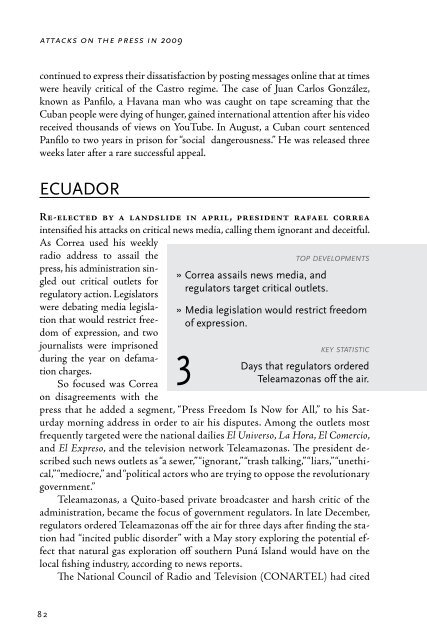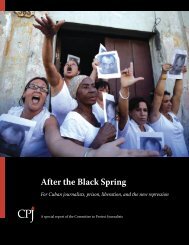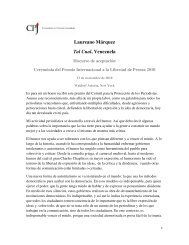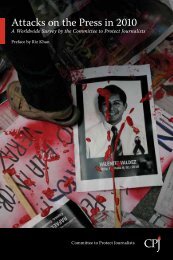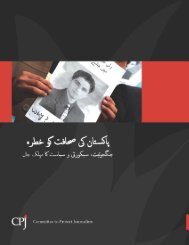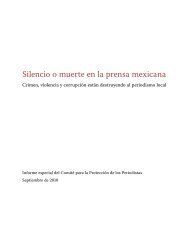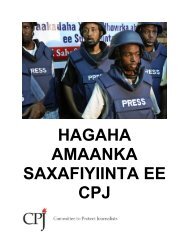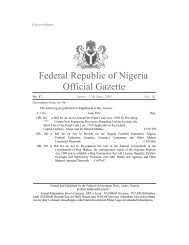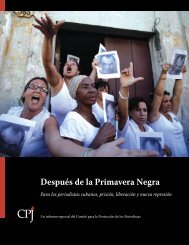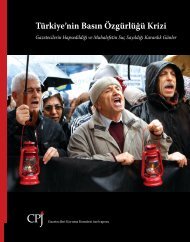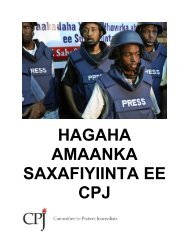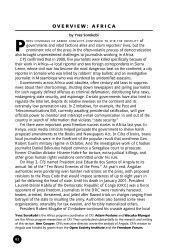Attacks on the Press - Committee to Protect Journalists
Attacks on the Press - Committee to Protect Journalists
Attacks on the Press - Committee to Protect Journalists
- No tags were found...
Create successful ePaper yourself
Turn your PDF publications into a flip-book with our unique Google optimized e-Paper software.
attacks <strong>on</strong> <strong>the</strong> press in 2009americas: ecuadorc<strong>on</strong>tinued <strong>to</strong> express <strong>the</strong>ir dissatisfacti<strong>on</strong> by posting messages <strong>on</strong>line that at timeswere heavily critical of <strong>the</strong> Castro regime. The case of Juan Carlos G<strong>on</strong>zález,known as Panfilo, a Havana man who was caught <strong>on</strong> tape screaming that <strong>the</strong>Cuban people were dying of hunger, gained internati<strong>on</strong>al attenti<strong>on</strong> after his videoreceived thousands of views <strong>on</strong> YouTube. In August, a Cuban court sentencedPanfilo <strong>to</strong> two years in pris<strong>on</strong> for “social dangerousness.” He was released threeweeks later after a rare successful appeal.ECUADORRe-elected by a landslide in april, president rafael correaintensified his attacks <strong>on</strong> critical news media, calling <strong>the</strong>m ignorant and deceitful.As Correa used his weeklyradio address <strong>to</strong> assail <strong>the</strong>press, his administrati<strong>on</strong> singledout critical outlets forregula<strong>to</strong>ry acti<strong>on</strong>. Legisla<strong>to</strong>rswere debating media legislati<strong>on</strong>that would restrict freedomof expressi<strong>on</strong>, and twojournalists were impris<strong>on</strong>edduring <strong>the</strong> year <strong>on</strong> defamati<strong>on</strong>charges.So focused was Correa<strong>on</strong> disagreements with <strong>the</strong>»»Correa assails news media, andregula<strong>to</strong>rs target critical outlets.t o p developments»»Media legislati<strong>on</strong> would restrict freedomof expressi<strong>on</strong>.key statistic3Days that regula<strong>to</strong>rs orderedTeleamaz<strong>on</strong>as off <strong>the</strong> air.press that he added a segment, “<strong>Press</strong> Freedom Is Now for All,” <strong>to</strong> his Saturdaymorning address in order <strong>to</strong> air his disputes. Am<strong>on</strong>g <strong>the</strong> outlets mostfrequently targeted were <strong>the</strong> nati<strong>on</strong>al dailies El Universo, La Hora, El Comercio,and El Expreso, and <strong>the</strong> televisi<strong>on</strong> network Teleamaz<strong>on</strong>as. The president describedsuch news outlets as “a sewer,” “ignorant,” “trash talking,” “liars,” “unethical,”“mediocre,” and “political ac<strong>to</strong>rs who are trying <strong>to</strong> oppose <strong>the</strong> revoluti<strong>on</strong>arygovernment.”Teleamaz<strong>on</strong>as, a Qui<strong>to</strong>-based private broadcaster and harsh critic of <strong>the</strong>administrati<strong>on</strong>, became <strong>the</strong> focus of government regula<strong>to</strong>rs. In late December,regula<strong>to</strong>rs ordered Teleamaz<strong>on</strong>as off <strong>the</strong> air for three days after finding <strong>the</strong> stati<strong>on</strong>had “incited public disorder” with a May s<strong>to</strong>ry exploring <strong>the</strong> potential effectthat natural gas explorati<strong>on</strong> off sou<strong>the</strong>rn Puná Island would have <strong>on</strong> <strong>the</strong>local fishing industry, according <strong>to</strong> news reports.The Nati<strong>on</strong>al Council of Radio and Televisi<strong>on</strong> (CONARTEL) had cited<strong>the</strong> network twice earlier in <strong>the</strong> year. After Teleamaz<strong>on</strong>as aired a bullfightingcommercial during an 8:30 p.m. slot in February, CONARTEL cited <strong>the</strong> stati<strong>on</strong>for violating a 6 a.m. <strong>to</strong> 9 p.m. ban <strong>on</strong> bullfight broadcasts, according t<strong>on</strong>ews accounts and CPJ interviews. When Teleamaz<strong>on</strong>as aired a news s<strong>to</strong>ry inMay that questi<strong>on</strong>ed <strong>the</strong> legality of a vote-counting facility in <strong>the</strong> coastal cityof Guayaquil, regula<strong>to</strong>rs said <strong>the</strong> stati<strong>on</strong> violated Article 58 of <strong>the</strong> BroadcastingLaw, which prohibits airing “news based <strong>on</strong> unfounded allegati<strong>on</strong>s that couldproduce social unrest.” The stati<strong>on</strong> was fined <strong>on</strong>ly nominal amounts in <strong>the</strong> firsttwo cases. But by building a record of supposed violati<strong>on</strong>s during <strong>the</strong> year, regula<strong>to</strong>rswere able <strong>to</strong> invoke <strong>the</strong> late-year suspensi<strong>on</strong>.In his public comments, Correa had fanned <strong>the</strong> regula<strong>to</strong>ry flames. In August,<strong>the</strong> president called for regula<strong>to</strong>rs <strong>to</strong> shutter Teleamaz<strong>on</strong>as after <strong>the</strong> stati<strong>on</strong>aired an audio recording of a 2008 presidential palace discussi<strong>on</strong> aboutc<strong>on</strong>stituti<strong>on</strong>al changes, according <strong>to</strong> local news reports.César Ricaurte, executive direc<strong>to</strong>r of <strong>the</strong> local press freedom group Fundamedios,said <strong>the</strong> president’s verbal assaults created a climate for physical attacksagainst <strong>the</strong> press. In May and December, unidentified individuals <strong>to</strong>ssed homemadeexplosives outside <strong>the</strong> Qui<strong>to</strong> offices of Teleamaz<strong>on</strong>as, press reports said. Noinjuries were reported. In February, unidentified assailants in Guayaquil fired 12gunshots at <strong>the</strong> offices of <strong>the</strong> weekly Mi Pueblo after <strong>the</strong> publicati<strong>on</strong> of a series ofarticles criticizing Correa’s administrati<strong>on</strong>.In late year, a legislative committee drafted a repressive communicati<strong>on</strong>s billthat would set educati<strong>on</strong>al requirements for journalists, stiffen criminal penaltiesfor press offenses, and allow some government censorship. The bill drewstr<strong>on</strong>g public and news media oppositi<strong>on</strong>, prompting <strong>the</strong> Nati<strong>on</strong>al Assembly inDecember <strong>to</strong> postp<strong>on</strong>e acti<strong>on</strong> and pledge revisi<strong>on</strong>s. The communicati<strong>on</strong>s bill isam<strong>on</strong>g legislati<strong>on</strong> intended <strong>to</strong> implement a new c<strong>on</strong>stituti<strong>on</strong> adopted by votersin 2008. The c<strong>on</strong>stituti<strong>on</strong> itself c<strong>on</strong>tains provisi<strong>on</strong>s troubling <strong>to</strong> press freedomadvocates, including Article 19, which states that <strong>the</strong> government “will regulate<strong>the</strong> prevalence of informati<strong>on</strong>al, educati<strong>on</strong>al, and cultural c<strong>on</strong>tent in <strong>the</strong> media’sprogramming and will promote <strong>the</strong> creati<strong>on</strong> of spaces for nati<strong>on</strong>al and independentproducers.”The regula<strong>to</strong>ry system itself underwent an overhaul. In August, Correa signeda decree creating <strong>the</strong> Ministry of Telecommunicati<strong>on</strong>s and Informati<strong>on</strong>, which,am<strong>on</strong>g o<strong>the</strong>r things, <strong>to</strong>ok over <strong>the</strong> regula<strong>to</strong>ry activities of both CONARTEL and<strong>the</strong> Nati<strong>on</strong>al Council of Telecommunicati<strong>on</strong>s.The government retained c<strong>on</strong>trol of two televisi<strong>on</strong> stati<strong>on</strong>s, TC Televisiónand Gamavisión, that it had c<strong>on</strong>fiscated in 2008. The government alleged that <strong>the</strong>stati<strong>on</strong>s’ owners had ties <strong>to</strong> a business c<strong>on</strong>glomerate accused of causing <strong>the</strong> 1998collapse of <strong>the</strong> Ecuadoran banking instituti<strong>on</strong>, Filibanco. The stati<strong>on</strong>s’ owners8 28 3


